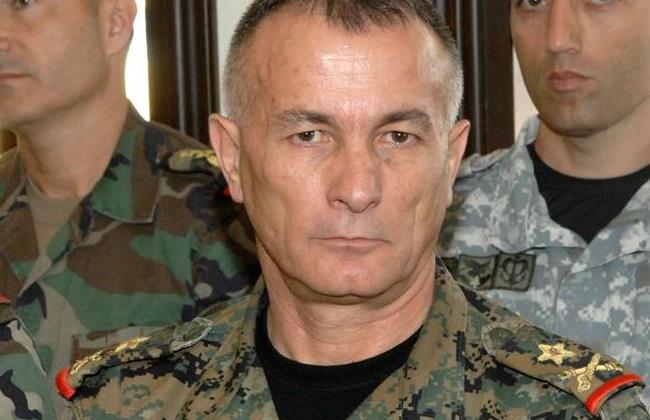
By Joseph A. Kechichian,Senior Writer – Gulf news
Boston,USA: Immersed in narrow outlooks, Lebanese politicians scrambled for relevance as regional and global actors increased their involvements in Syria, where heightened tensions endangered the relative internal stability of this vulnerable country. As confrontations increased in frequency and violence, elites huddled around national dialogue round-tables that, for lack of a better term, required seriousness or meaningful objectives. After months during which politicians engaged in conversations, shared viewpoints, and otherwise pretended to place the interests of the nation ahead of narrow goals, they failed to settle on the principal roadblock, namely the election of a head-of-state. Instead, each and everyone concentrated on peripheral issues that skirted fundamentals, further distancing the body politic from citizens.
On Thursday, Brigadier-General Chamel Roukoz addressed a rally organised in his honor at Beirut’s Martyrs Square, ostensibly as a sign of “solidarity” only a few hours after he retired from the army. “I’m Chamel Roukoz, an army commando officer who was promoted hours ago to the rank of ‘citizen’,” declared the outgoing Commando Regiment chief, though what was remarkable with this farewell was the promise that this officer would presumably “not retire [from political life] because struggle and love for one’s country are not confined to a suit, a post or a job.”
Roukoz promised to “always be the man you know” as he pledged to have “further meetings” with supporters. Except for his father-in-law, General Michel Aoun, no other retiring army officer ever made such a promise for a transition that, truth be told, stood out as yet another sign of the direction he intended to pursue.
For his part, Aoun stated that the Free Patriotic Movement ministers would no longer attend cabinet meetings aimed at addressing mundane concerns, including the lingering waste crisis, because he objected to the way Prime Minister Tammam Salam and his government handled the contentious security promotions and appointments file. Rather than accept the course set by Samir Moqbel, the Minister of Defense, and General Jean Qahwaji, the Commander of the Army, Aoun declared his readiness to sabotage the work that the government to which he belongs ought to devote.
This confusion was, regrettably, not limited to Aoun after the Progressive Socialist Party leader, Walid Junblatt, trekked to Saudi Arabia where he met with senior officials as well as the head of the Future Movement, former Prime Minister Saad Hariri, to whom he proposed a new “comprehensive” deal over the presidential deadlock and the garbage disposal crisis.
Beyond comical aspects that tied these two issues together, what was incredibly naïve was to believe that an agreement could thus be reached over a new president, along with understandings over a new government and parliamentary elections. After all, it was Junblatt who fielded his own tangential applicant, Henri Helou, precisely to either prevent Aoun, the March 8 candidate, or Samir Geagea, the March 14 nominee, from being elected in the first place. By putting Helou’s nomination forward, Junblatt telegraphed his desire to play “King-maker” though he neglected to consider that such maneuvers came to naught, in the absence of a kingdom where all subjects presumably accepted the ruler’s authority.
Whether the significantly weakened March 14 hierarchy perceived the Junblatt confusion as a good omen or not was secondary to its own machinations. In fact, Interior Minister Nouhad Mashnouq warned everyone on Friday that the Future Movement might quit the government and the ongoing dialogue sessions if the political deadlock continued. This act of defiance highlighted the level of frustration that existed among Lebanese elites, with Mashnouq stating that “former Prime Minister Saad Hariri would not accept turning the ‘suspension of conflict’ (with Hezbollah) in the cabinet, into a ‘suspension of patriotism, conscience and voices’.”
Mashnouq believed that Hezbollah hijacked state institutions and reneged on various promises to implement security plans throughout the country that were still in abeyance. He also defied Michel Aoun, declaring that “the doors of the Lebanese political system cannot be opened through ‘the approach of storming and smashing’,’ which was certainly a colorful way of putting the current deadlock.
Naturally, and after three months of bickering over how to collect most of the garbage that was still sitting in most street corners throughout Beirut and Mount Lebanon, this major impasse may have been finally solved as Agriculture Minister Akram Shehayyeb pleaded for the implementation of the agreement reached during a meeting chaired by Prime Minister Tammam Salam last Thursday. According to the latest information, the plan foresaw the establishment of a landfill in the Bekaa Valley, to be used alongside the Srar dump in the northern region of Akkar, even if inhabitants in the area were unhappy with the choice.
Amazingly, wily politicians deliberately postponed such mundane decisions that should have been resolved within hours, and plunged the country into a trash disposal crisis after the closure of the Naameh landfill on July 17. Their methods spoke volumes on their abilities to agree on what would further damage the economy and threaten public health. Nevertheless, what the delays illustrated was how convenient these actions were. No matter how often civil society members complained about or demonstrated against, no politician was ready to alter tested mechanisms in place that served them well, even when they were confronted by looming internal and regional crises. Politicians scrambled for meaningful discourses while the country further sank into chaos that, amazingly, was not deemed to be a recipe for disaster.



